
10 Ways to Find Credible Academic Sources Faster Than Google Scholar
Finding reliable academic sources can be time-consuming, especially when traditional tools like Google Scholar overwhelm you with too many results. This article highlights 10 AI-powered tools designed to simplify and speed up your research process. These platforms go beyond basic keyword searches, offering features like citation analysis, smart summaries, and concept-based recommendations. Here's a quick summary:
- Sourcely: Analyzes your essay and suggests sources for citation, starting at $7 for a trial.
- Semantic Scholar: Free platform with AI-generated summaries and semantic search.
- Anara: AI-assisted literature reviews with citation confidence levels, integrated with Zotero.
- Research Rabbit: Visualizes academic networks and tracks citation connections.
- Scite: Evaluates citations as supportive, neutral, or contradictory.
- Elicit: Automates literature reviews by extracting key data points.
- Avidnote: Combines note-taking, PDF annotation, and citation management.
- Keenious: Matches articles based on the meaning of your query.
- Web of Science Research Assistant: Offers curated, peer-reviewed results using AI.
- Scopus AI: Enhances Scopus searches with advanced AI features.
These tools help you save time, manage citations, and focus on analyzing research rather than searching for it. Whether you're a student or a professional researcher, these AI-driven solutions offer tailored options for various budgets and needs.
Eight Best Free AI Tools for Academic Research
1. Sourcely: AI-Powered Academic Source Discovery
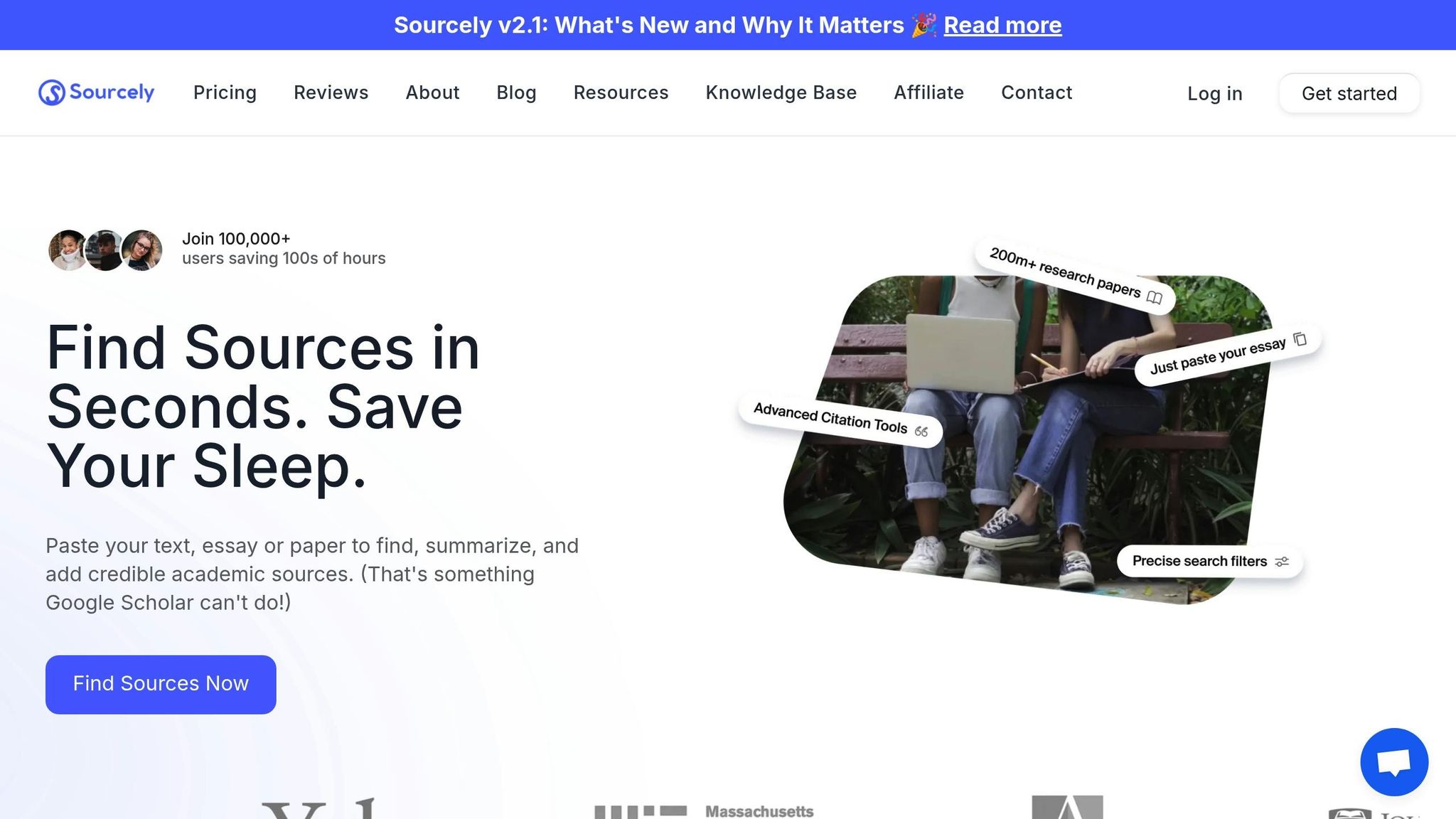
Sourcely is an AI-driven tool that simplifies academic research by analyzing your work and identifying the best sources to support your arguments. Instead of spending hours scrolling through endless search results, you can simply paste your essay into the platform. Sourcely’s AI pinpoints where citations are needed and suggests sources to back up your claims. Let’s dive into its standout features.
AI-Driven Features for Academic Research
Sourcely’s AI doesn’t just match keywords - it dives deeper. It analyzes the concepts, themes, and arguments in your writing, offering recommendations tailored to your specific needs. This means you’re not just getting a list of related articles but carefully selected sources that enhance your work.
The platform also offers advanced search filters, making it easier to refine your results. Plus, it provides concise summaries of research papers, so you can quickly decide if a source is relevant before committing to reading the full text. This feature alone can save you a ton of time during the initial stages of your research.
Streamlined Source Discovery
Sourcely integrates multiple research steps into a single workflow, delivering targeted recommendations instantly. You’ll gain access to millions of sources, many of which come with free PDF downloads.
On top of that, the platform’s export feature simplifies citation management. It automatically formats references in various styles, so you can easily add them to your bibliography without extra hassle.
Pricing and Accessibility for US-Based Researchers
Sourcely offers flexible pricing options to suit different research needs. For students or casual users, there’s a one-time payment of $7.00 that covers 2,000 characters, letting you test out the Pro features before committing to a subscription.
For more extensive projects, you can choose a monthly plan for $17.00 or an annual plan for $167.00. If you’re looking for a long-term solution, the lifetime Believer plan is available for $347.00, granting permanent access to all features without recurring charges.
There’s also a free tier with basic functionality for those on a tight budget. Paid plans unlock premium features like full essay analysis, access to the complete database of sources, and tools to streamline your research process. Whether you’re a student or a professional researcher, Sourcely provides options to fit your needs.
2. Semantic Scholar: Smart Summaries and Citation Networks
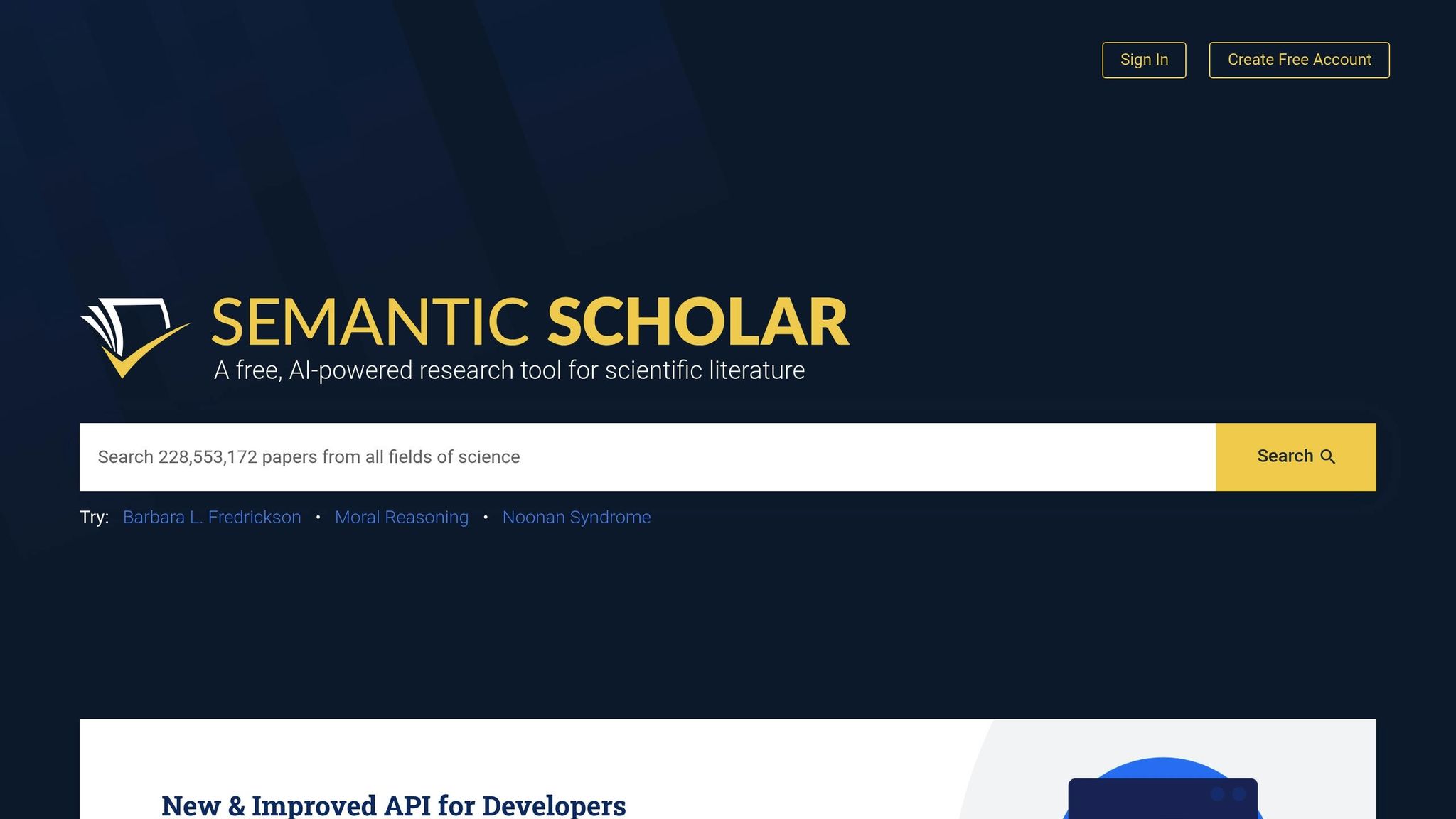
Semantic Scholar is a free, AI-powered platform designed to transform how academic research is conducted. Unlike traditional search engines that rely on simple keyword matching, this platform uses artificial intelligence to grasp the context of your research queries, delivering results that are not just faster but far more relevant. It’s a tool built to make finding and organizing academic resources quicker and easier.
AI-Driven Features for Academic Research
One standout feature is the AI-generated TLDRs that appear at the top of research papers. These summaries help you quickly determine if a paper is worth diving into, saving you valuable time.
Semantic Scholar also excels with its semantic search capabilities. For instance, if you search for "machine learning applications in healthcare", the platform can identify related concepts like "artificial intelligence in medicine" or "predictive modeling in clinical settings." This contextual understanding helps you uncover a broader range of relevant literature without manually tweaking your search terms.
Streamlined Source Management
The platform’s Library feature makes it easy to save, organize, and export citations. This functionality simplifies managing your research materials, helping you stay focused on your work instead of getting bogged down by logistics.
Alignment with US Academic Standards
Semantic Scholar is built with US academic practices in mind. It supports widely used citation formats like MLA, APA, and Chicago. For those working with LaTeX, it offers citations in BibTeX format, and you can also download them as EndNote .enw files. Additionally, the platform integrates seamlessly with Mendeley, allowing you to sync your research across devices and platforms. This ensures your workflow remains compatible with institutional requirements and academic standards in the US.
Free Access for US-Based Researchers
One of the platform’s most appealing aspects is that it’s completely free. There are no subscription fees or hidden costs, and you don’t even need a credit card to sign up. This makes Semantic Scholar accessible to students, researchers, and academics, regardless of financial constraints. From AI-powered search to citation management, all core features are available at no cost, making it an invaluable resource for US-based researchers working within tight budgets.
3. Anara: Systematic AI Literature Review Workflows
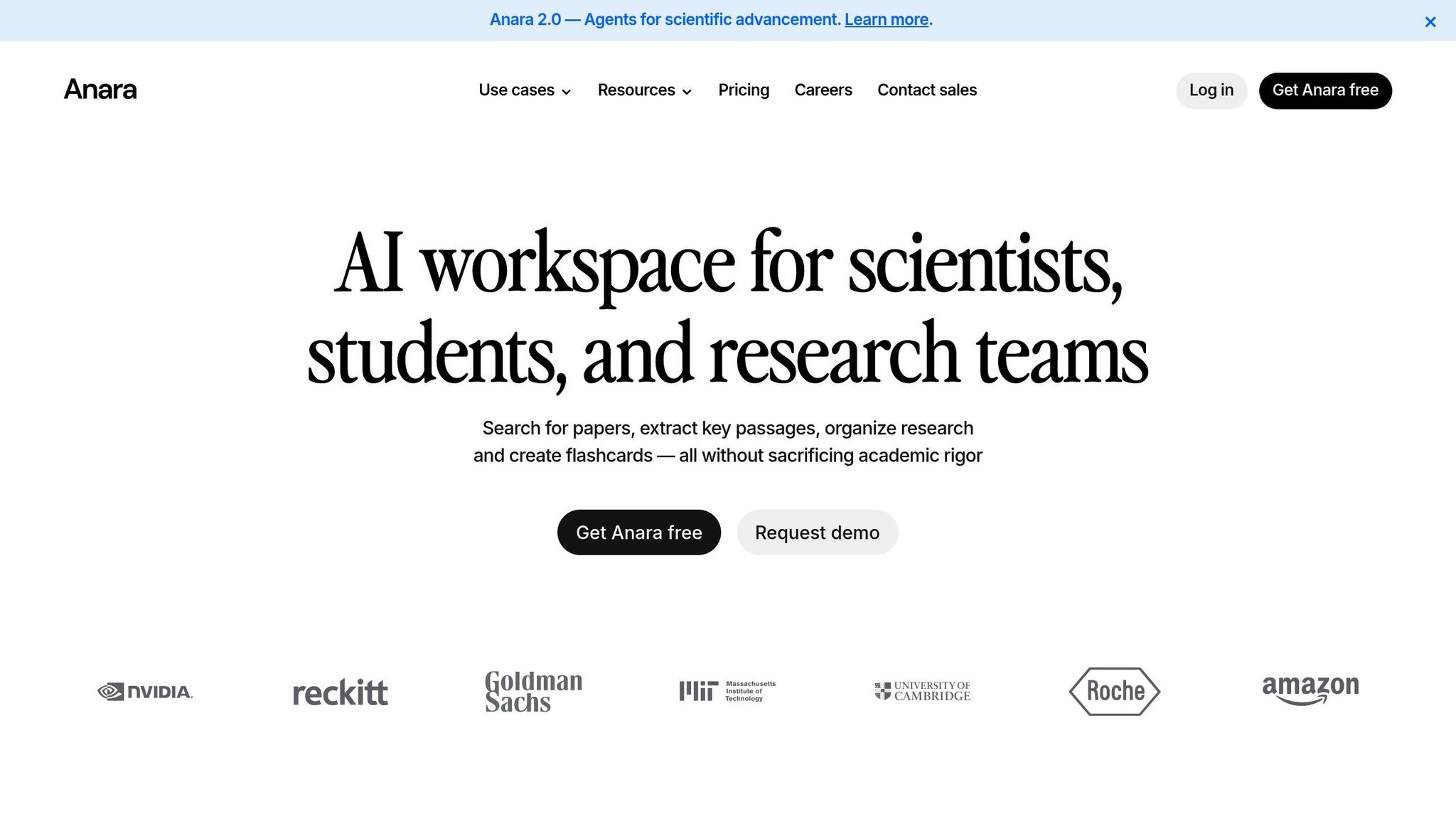
Anara simplifies the often time-consuming process of conducting literature reviews by offering an AI-powered workflow that goes beyond basic search tools.
AI-Driven Features for Academic Research
One of Anara's most impressive features is its source highlighting capability. This function links AI-generated responses directly to specific passages in the original text, making it easy to verify information and avoid inaccuracies. No more second-guessing - just click and confirm.
The platform also assigns confidence levels to each citation, giving researchers a clear sense of how reliable a source is for their work.
"Citation magic: @CreateCitation generates references in APA, MLA, Chicago, or whatever format your professor demands. No more citation generators that somehow always get it wrong."
- AnaraAI for Science
The @CreateCitation agent automates the process of generating citations in formats like APA, MLA, Chicago, and IEEE. This feature not only saves time but also ensures accuracy, making it a must-have for academic writing.
Efficiency in Finding Sources
Anara doesn’t stop at citations - it takes research efficiency to the next level. By integrating with Zotero, it allows users to import their existing reference libraries for AI-assisted analysis and citation creation. Its built-in writing environment means you can search, analyze, and cite all in one place, eliminating the hassle of switching between multiple tools.
Compatibility with US Academic Standards
Anara is designed with US academic requirements in mind, supporting major citation formats such as MLA, APA, and Chicago.
"Supports MLA, APA, IEEE, Chicago with proper formatting"
- AnaraAI for Science
The source highlighting feature [6,9] further ensures compliance with strict academic standards, making it easier for researchers to maintain accuracy. For those in technical fields like engineering or computer science, Anara also supports IEEE formatting, addressing the specific needs of these disciplines.
Pricing and Accessibility for US-Based Researchers
Anara combines its powerful features with a pricing model that is accessible for students and scholars in the US. Its integration with free tools like Zotero brings advanced AI-driven research capabilities within reach of typical academic budgets. Plus, its all-in-one citation management within the writing environment eliminates the need for additional tools, making it both efficient and cost-effective for researchers.
4. Research Rabbit: Visualizing Academic Networks
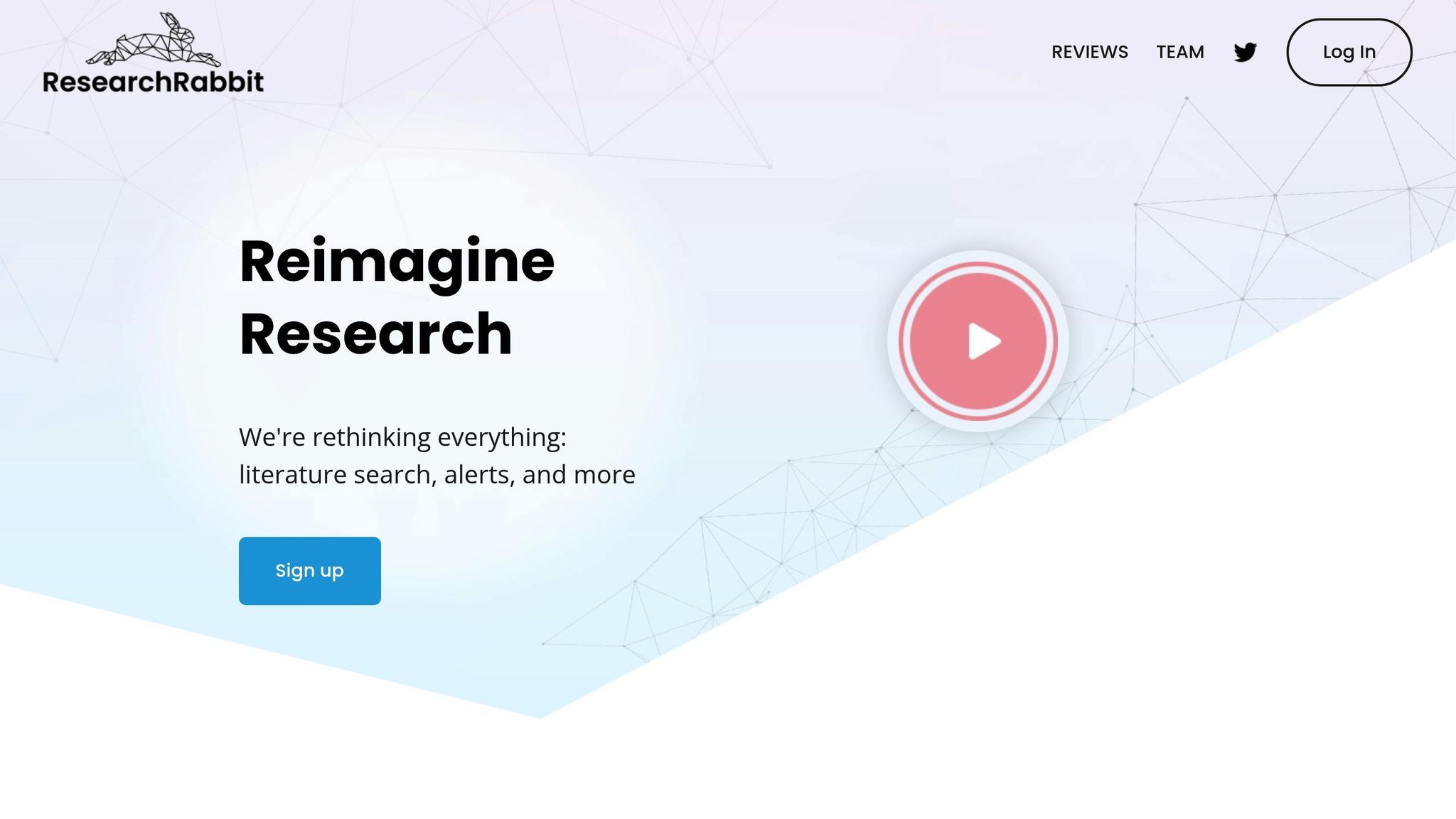
Research Rabbit takes the hassle out of literature searches, helping researchers uncover connections between papers in just minutes.
AI-Powered Tools for Smarter Research
Research Rabbit uses machine learning to dig deep into citation trails, co-citation networks, and topic similarities. Its standout feature is a visualization map paired with seed-based recommendations, offering modes like "Similar work", "Earlier work", and "Later work." These tools uncover links between studies that might otherwise go unnoticed [10,11,12,13].
"Spotify for Papers"
- Research Rabbit [10,11]
Think of it as a playlist service for academic research. The platform learns your interests and suggests papers tailored to your specific field [10,11].
Simplifying Source Discovery
Instead of manually tracking citations, Research Rabbit gives you a clear visual representation of research landscapes. This makes it easier to see the bigger picture without getting bogged down in individual citation chains.
Seamless Integration with US Academic Tools
Research Rabbit aligns perfectly with US academic workflows by supporting BibTeX and RIS exports. These formats work effortlessly with popular tools like Zotero, EndNote, and Mendeley [10,12]. Plus, it provides complete metadata for citations, ensuring everything is formatted correctly for research standards in the US.
Free Access for Researchers
Best of all, Research Rabbit is entirely free. This makes it an invaluable resource for graduate students and early-career researchers who might not have the budget for subscription-based tools. The platform is committed to staying "free forever for researchers" [10,13]. With its user-friendly features and cost-free access, Research Rabbit is reshaping how academics approach literature searches.
5. Scite: Citation Analysis with Context
Scite is reshaping how academic work is evaluated by revealing the nature of citations between papers - whether they are supportive, contradictory, or simply mentions.
AI-Driven Features for Academic Research
By leveraging natural language processing, Scite digs into the full text of scientific articles to extract "Citation Statements" - specific excerpts where authors refer to other studies. Using a deep learning model, it categorizes these citations as supportive, contradictory, or neutral, assigning a confidence score to each.
Scite's Smart Citations database includes 1.2 billion citations across more than 200 million sources, offering precise and reliable insights. This classification system simplifies the often time-consuming literature review process.
"Scite is an AI-powered research tool that helps researchers better discover and evaluate scientific literature through Smart Citations - a revolutionary system that shows whether articles support, contrast, or simply mention a given claim." - Scite.ai
The platform also features Scite Assistant, which uses large language models (LLMs) alongside the Smart Citations database. This tool minimizes hallucinations and provides accurate, up-to-date references for tasks like answering queries, drafting grant proposals, and offering writing assistance.
Efficiency in Finding Sources
Scite’s AI-driven analysis eliminates much of the guesswork involved in understanding citation relationships, making literature reviews faster and more efficient. Its Reference Check tool flags retracted articles automatically, while users can click on citations within excerpts to instantly access related works.
"The feature that classifies papers on whether they find supporting or contrasting evidence for a particular publication saves so much time. It has become indispensable to me when writing papers and finding related work to cite and read." - Emir Efendić, Ph.D., Maastricht University
With over 1,740,000 users - including students, researchers, and professionals - Scite has proven its value for academic work. It has also partnered with more than 30 leading publishers to provide access to both open-access and paywalled content.
Compatibility with US Academic Standards
Scite aligns with rigorous US academic protocols, ensuring that its tools meet the high standards required for research integrity. By offering direct access to text snippets where citations appear, it helps researchers verify sources easily and maintain proper citation practices.
"As a PhD student, I'm so glad that this exists for my literature searches and papers. Being able to assess what is disputed or affirmed in the literature is how the scientific process is supposed to work, and Scite helps me do this more efficiently." - Kathleen C McCormick, Ph.D. Student, Cornell
Scite’s credibility is further reinforced by accolades such as the ISMTE People's Choice Award, the ALPSP Award for Innovation in Publishing, and the NSF Phase 1 SBIR Grant, highlighting its impact within the US academic community.
6. Elicit: Automated Literature Review Assistant
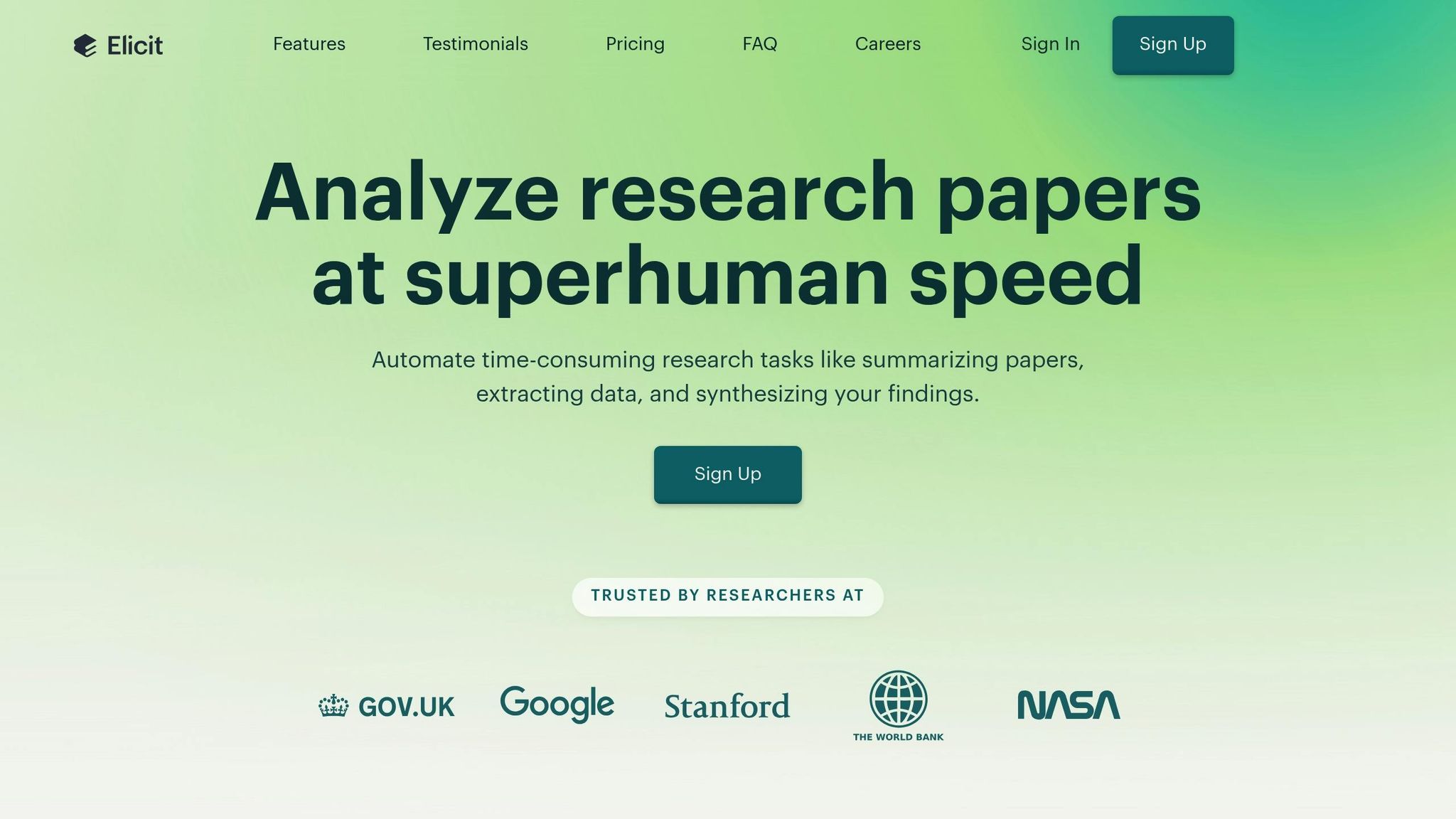
Elicit takes the spotlight as a tool designed to simplify and speed up academic research, particularly literature reviews. By automating tasks that typically demand hours of manual effort, Elicit helps researchers focus on insights rather than the tedious process of gathering data. This AI-powered platform is especially useful for systematic reviews and meta-analyses, thanks to its ability to extract precise information from academic papers.
AI Features Tailored for Researchers
What makes Elicit stand out is its ability to extract specific data points based on custom queries. Instead of merely locating academic papers, it dives into the content, pulling out critical details like sample sizes, methodologies, key findings, and statistical results. Each extracted piece of data is accompanied by supporting quotes from the original source, ensuring transparency and accuracy. This approach allows researchers to streamline their review process while maintaining a high standard of rigor.
Streamlining the Literature Review Process
Elicit saves researchers significant time by automating repetitive tasks. For example, instead of manually sifting through abstracts to identify relevant studies, users can input their research questions, and the platform will analyze and summarize pertinent papers. Additionally, Elicit integrates with Zotero, a popular reference management tool, allowing users to import their research libraries and conduct AI-driven analyses seamlessly.
Meeting US Academic Standards
Elicit is built to align with the rigorous standards of US academic institutions. It supports exporting bibliographic data in widely accepted formats like RIS and BIB, ensuring compatibility with major citation management tools. This makes it easy for researchers to create properly formatted citations and bibliographies in styles like APA and MLA. The platform also emphasizes traceability, ensuring every extracted data point is linked back to its original source for verification.
Pricing Options for Researchers
For US-based researchers, Elicit offers a Plus plan at $10.00 per month when billed annually ($120.00 per year) or $12.00 per month with monthly billing. This plan includes export options in RIS, CSV, and BIB formats, providing an affordable and flexible solution for those looking to enhance their research efficiency.
sbb-itb-f7d34da
7. Avidnote: Integrated Research Hub
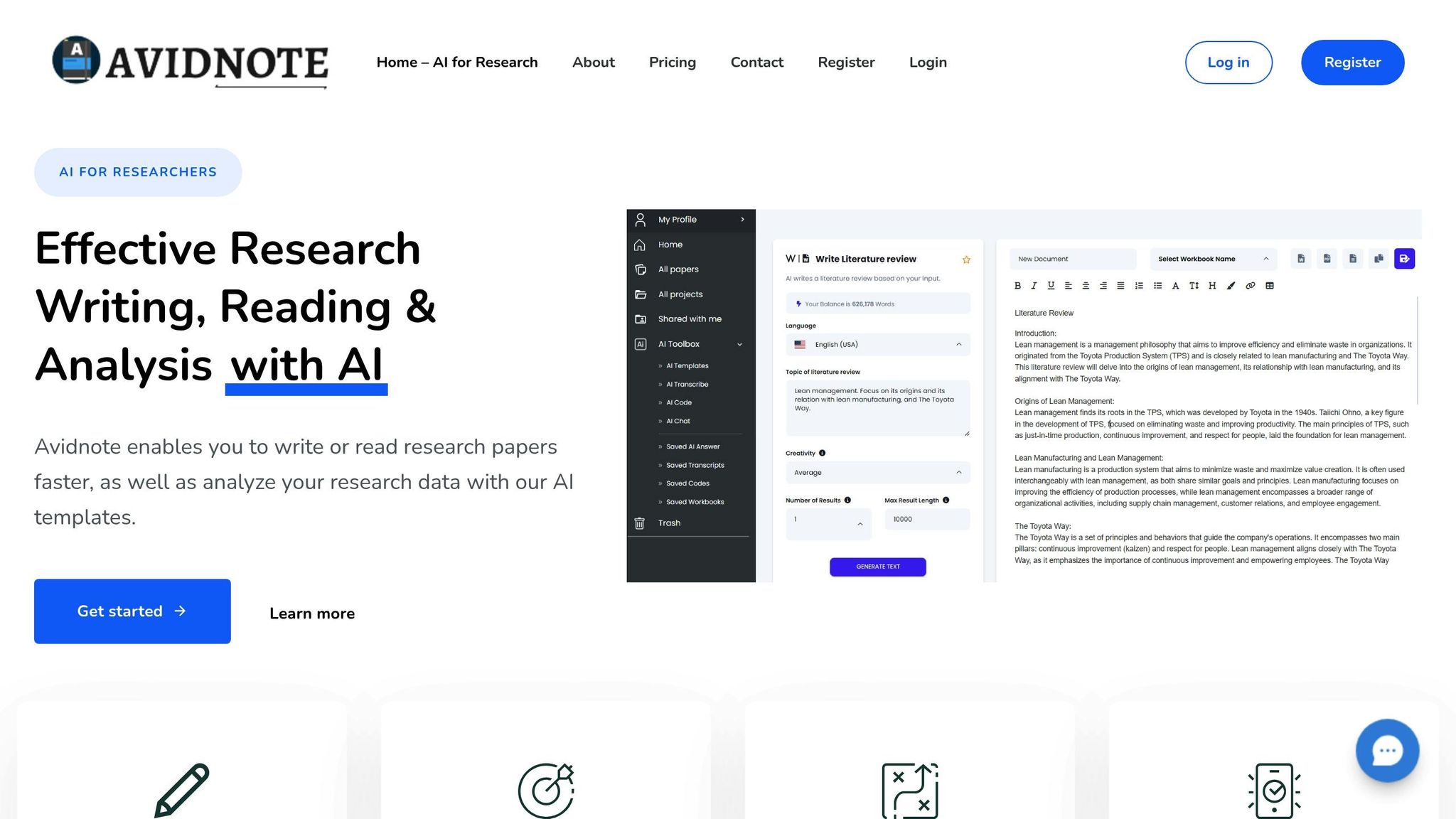
Avidnote brings together seamless note-taking and efficient source management, transforming your research process into one unified workspace. Unlike juggling multiple apps, Avidnote offers a single platform that combines PDF annotation, citation management, and collaborative writing. This eliminates the constant back-and-forth between tools, helping you maintain focus and momentum during your research.
With AI-powered features, Avidnote takes source discovery to the next level. It can automatically extract key details from uploaded documents and even suggest connections between your notes and sources. The platform’s smart organization system groups research materials by topics and themes, making it a breeze to find exactly what you need when writing. Plus, its collaborative workspace lets research teams share annotations and sources in real time - perfect for group projects, which are especially common in academic settings across the U.S.
What truly sets Avidnote apart is its ability to maintain context throughout your research journey. As you annotate and take notes, the platform creates a knowledge map that highlights gaps in your research and suggests new areas to explore. This not only saves time on organizing materials but also allows you to dive deeper into analysis and synthesis, aligning perfectly with the goal of efficient academic source discovery.
From integrating research tools to simplifying workflows, Avidnote lays the groundwork for the next tool, which focuses on connecting academic ideas through advanced concept-based recommendations.
8. Keenious: Concept-Based Article Recommendations

Keenious stands out as an AI-driven research tool that focuses on understanding the intent behind your query to deliver highly relevant sources. Unlike traditional keyword-based searches, Keenious zeroes in on the meaning of your input - whether it's a brief prompt, a PDF file, or highlighted text. By leveraging its advanced language model, the platform enhances even the shortest queries with added context, ensuring meaningful and precise search results.
AI-Powered Features for Smarter Research
At the heart of Keenious is its semantic interpretation technology, which digs deeper than mere keywords. It analyzes the meaning of your query, including specific terms, entities, and methodologies, to identify papers that truly align with your topic - even if they use different wording or are written in another language.
Keenious generates a thematic "fingerprint" for your query and matches it against similar fingerprints from articles in the OpenAlex database. This process uncovers research that traditional searches often overlook, making it a valuable tool for pinpointing sources in both specialized and cross-disciplinary fields.
The platform also ranks results based on several factors, including its semantic understanding, term specificity when explicitly required, citation metrics, and how recently the work was published. Additionally, Keenious provides AI-driven explanations of complex concepts and methodologies within the articles it finds. While it doesn't perform the analysis for you, it simplifies dense academic material, making it easier to understand. With support for nearly 100 languages, you can even search in your native language.
Streamlining the Search Process
Keenious is designed to prioritize efficiency. It uses strategic signals - such as abstract availability and DOI prioritization - to surface the most useful results without imposing restrictive filters, leaving you in control of your search.
Its ability to find semantically similar articles is particularly useful for interdisciplinary research, where relevant sources often use varied terminology. This feature is especially helpful for navigating emerging fields or exploring topics that span multiple disciplines, areas where traditional search methods often fall short.
Tailored for US Academic Standards
Keenious also caters to the specific needs of US-based academic institutions. Its built-in citation tool supports a variety of formats, including APA, MLA, and Chicago, ensuring alignment with the documentation styles commonly required by American universities. You can easily download citations and integrate them into your reference management system, saving time during the research and writing process.
The platform further integrates with Microsoft Word and Google Docs, two of the most popular tools in US academic settings. This allows you to seamlessly incorporate research findings into your writing without needing to switch between platforms. For added convenience, Keenious lets you select your citation style directly within the platform or export them for compliance with specific institutional guidelines. However, it’s always a good idea to confirm citation requirements with your instructor or institution, as they can vary depending on the field or program.
9. Web of Science Research Assistant: AI Integration for Science and Interdisciplinary Research
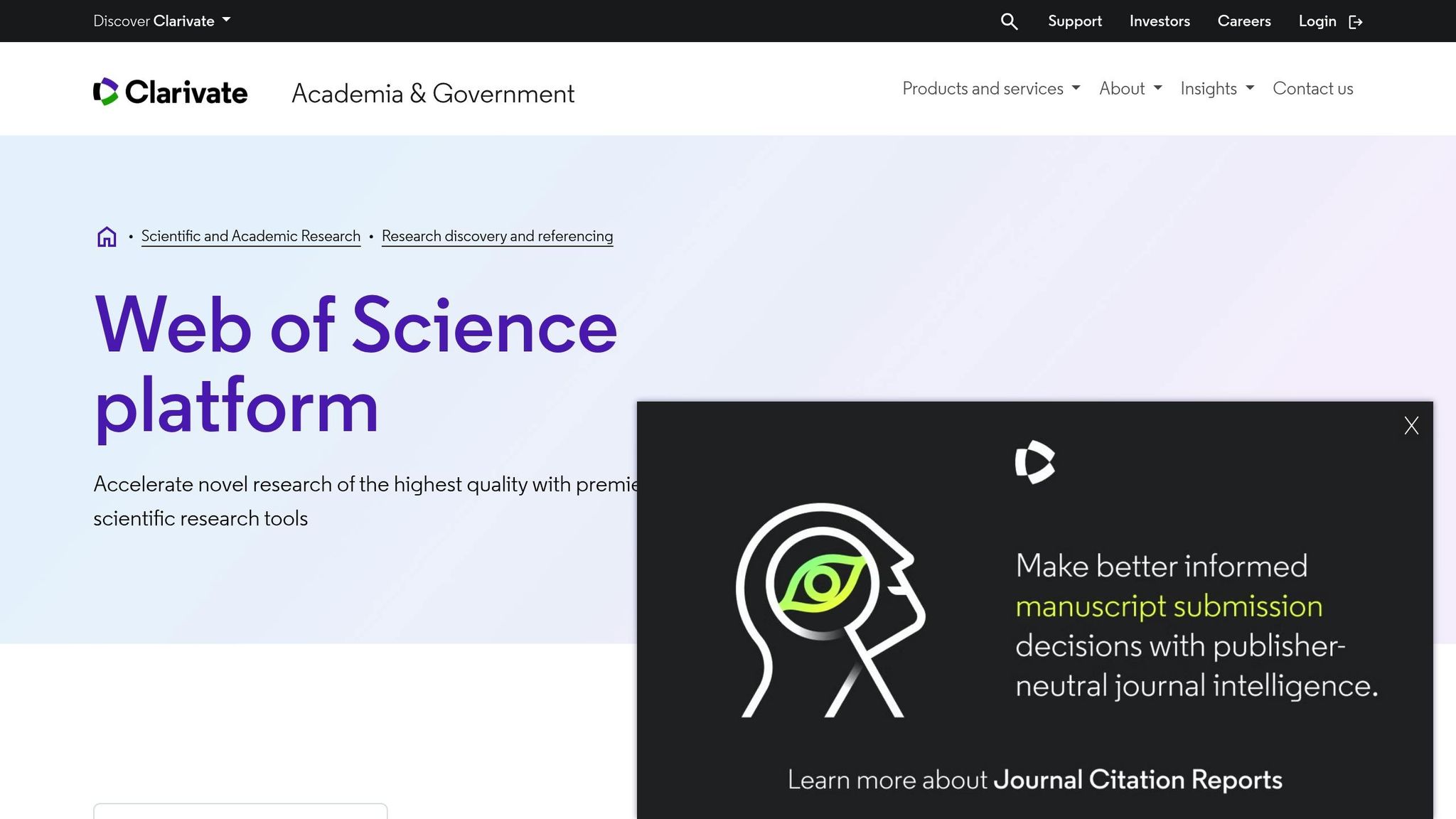
The Web of Science Research Assistant builds on over 120 years of indexed, curated academic content from the Web of Science Core Collection. Designed in collaboration with researchers and librarians, this tool tackles the challenges of academic research with advanced AI capabilities.
AI-Driven Features for Academic Research
This tool employs Retrieval Augmented Generation (RAG) and pre-trained large language models to transform natural language queries into precise Boolean searches. These searches pull from the top eight relevant, peer-reviewed articles within the Core Collection. The result? Research informed exclusively by high-quality, vetted sources.
One standout feature is its ability to reject misleading or trick questions when no supporting documents exist, reducing the risk of misinformation. Additionally, it enhances transparency by displaying the generated Boolean query alongside search results, making it clear how the tool arrives at its conclusions.
Streamlining the Research Process
The assistant synthesizes data from multiple high-quality sources, saving users from manually reviewing countless abstracts. While repeated queries might yield slight variations in results, this variability can help uncover additional insights.
"As we tested the Web of Science Research Assistant, we recognized that it has huge potential for surfacing useful papers and content and helping students and researchers take a deep dive into content faster. I especially appreciate the visualizations, which are easy to access as you work with the assistant."
- Elizabeth Killeen, Life Sciences Librarian, Imperial College London
By focusing on curated, peer-reviewed content, the platform ensures researchers engage with only the highest-quality academic materials.
Meeting US Academic Standards
The Research Assistant aligns with US academic requirements, emphasizing privacy and security. Developed and tested with input from major US institutions, it addresses the specific needs of American researchers and students.
"We're excited about the AI features that Web of Science is developing. I think Web of Science Research Assistant will be far superior to the other genAI tools currently available to faculty and students at the moment."
- Juan P. Denzer, Engineering & Computer Science Librarian, Syracuse University
Clarivate, the company behind the platform, ensures that publisher content, library-owned resources, and user data remain private. None of this information is shared with language models for training, and all access occurs within secure, private environments.
Pricing and Accessibility for US-Based Researchers
The Web of Science Research Assistant is offered as a premium add-on to the Web of Science platform. While specific pricing details aren’t publicly available, institutions can request free trials to test the service before subscribing. For those already using the Web of Science Core Collection, the assistant seamlessly integrates into their existing research systems. Trial periods, such as a 2-week access window for up to 100 simultaneous users, have been part of institutional evaluations.
"Research Assistant is in its infancy, yet it is a much better platform for research inquiries than the existing free models because it is limited to use only vetted research. It is worth investigating, especially if your institution subscribes to the existing WoS Core Collection."
- Jason A. Reuscher, Research and Instructional Librarian, Pennsylvania State University
10. Scopus AI: Advanced Academic Search with AI
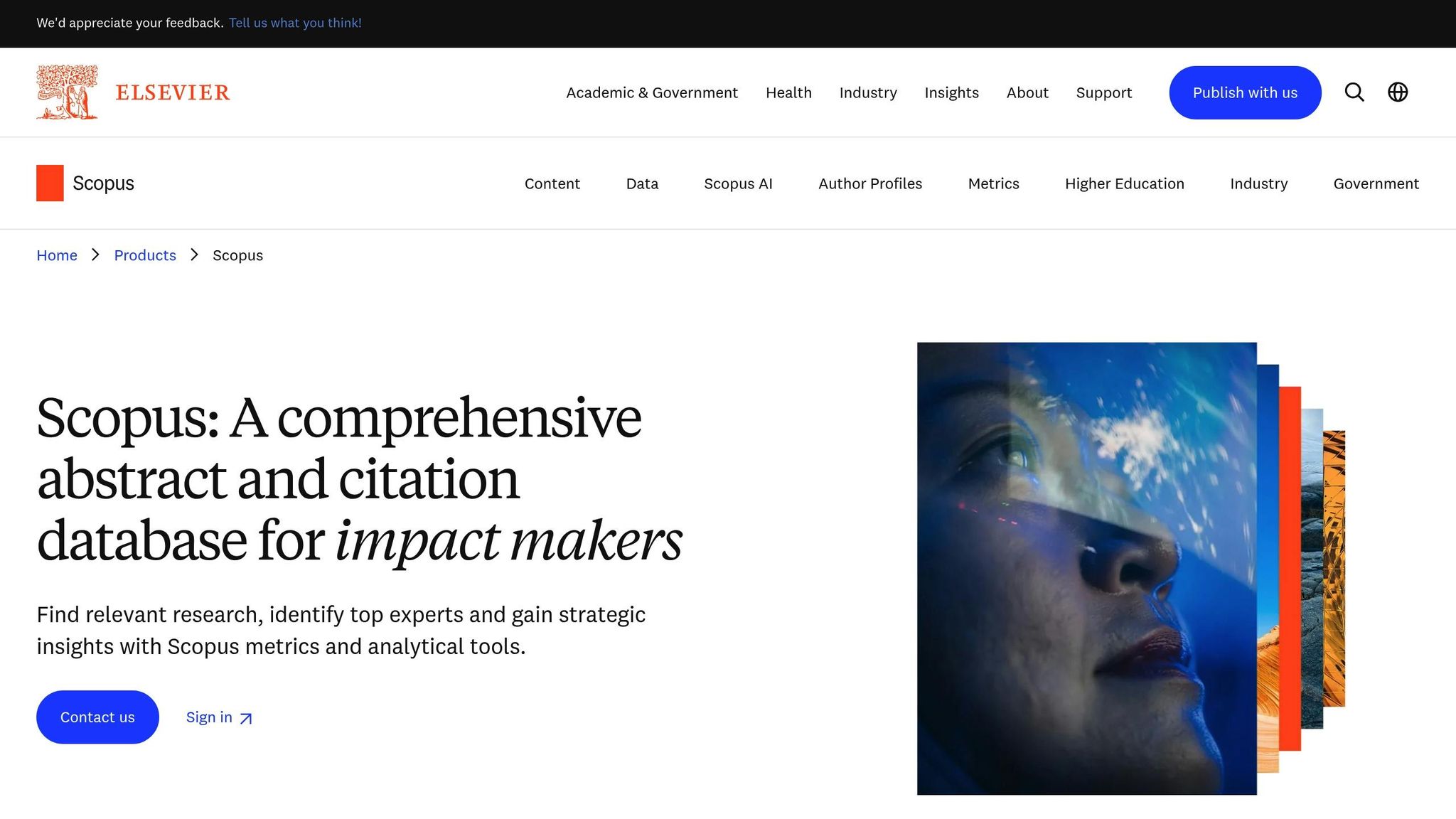
Scopus AI takes academic research to the next level by boosting efficiency and precision. This add-on module is part of the Scopus platform and is accessible to U.S. researchers through institutional subscriptions. However, institutions need to purchase additional licensing to access it, and the pricing details are not publicly disclosed.
The module integrates effortlessly into existing research systems, enhancing Scopus's core features without requiring users to switch platforms. For institutions already subscribed to Scopus, the AI component works seamlessly with standard authentication methods like IP filtering, single sign-on (SSO), and Shibboleth. For more details or to get a tailored quote, institutions can reach out directly to Elsevier.
Tool Comparison Table
Choosing the right academic tool can make a big difference in how efficiently you conduct your research. The table below outlines the main features and pricing of Sourcely, designed specifically with U.S. scholars in mind.
| Tool | AI Capabilities | Ease of Use | Pricing (USD) | Citation Support | Best For |
|---|---|---|---|---|---|
| Sourcely | AI-powered academic source discovery and placement recommendations | Very Easy | $7 trial (2,000 chars), $17/month, or $167/year | Supports APA, MLA, and Chicago styles | Students needing source placement guidance |
Sourcely stands out for its ability to quickly and accurately find academic sources while offering strong citation support for APA, MLA, and Chicago styles. Its user-friendly design ensures that even first-time users can navigate it with ease. For students and researchers aiming to simplify the process of integrating sources into their work, Sourcely provides a reliable and efficient solution tailored to their needs.
Conclusion
AI-driven tools like Sourcely are reshaping the way academic research is conducted, offering speed, precision, and context that go far beyond what traditional search methods can achieve.
These platforms are quickly becoming essential in academic research, with over 5,000 U.S. institutions relying on them to access and analyze a massive database of more than 200 million research papers. This growing adoption highlights a shift toward tools that not only locate sources but also analyze, summarize, and contextualize information - saving researchers significant time and effort.
The advantages extend beyond just efficiency. Features like semantic search, smart summaries, and network visualization make it easier to identify relevant connections between sources. Tools that suggest related articles, provide exportable citations, and integrate with reference management software streamline the entire research process. For U.S. scholars, who often face demanding citation and research standards, these capabilities can make a significant difference. They enable more precise results, better evaluation of source quality, and simplified citation management, whether you're tackling an undergraduate paper or diving into doctoral-level research.
FAQs
How does Sourcely ensure the academic sources it recommends are credible and relevant to my research?
Sourcely leverages cutting-edge algorithms to analyze the trustworthiness and importance of academic sources. It evaluates critical aspects like the publication's reputation, whether it’s peer-reviewed, and citation data to provide top-tier recommendations.
On top of that, Sourcely customizes its results by sorting sources according to factors like publication date and how closely they align with your topic. This way, you get reliable, current, and highly relevant materials, helping you save time while boosting the precision of your research.
How do AI-powered tools like Sourcely make academic research faster and more effective?
AI-driven tools such as Sourcely are changing the game for academic research. These tools use advanced algorithms to quickly find and prioritize credible, peer-reviewed sources, cutting down the time you’d normally spend digging through endless search results.
What’s even better is their ability to tailor results to your specific research needs. By delivering personalized, context-aware recommendations, they ensure you access the most relevant and reliable information. This doesn’t just make the literature review process faster - it also boosts accuracy and precision, helping you focus on what truly matters.
Are there any limitations to using Sourcely for academic research?
Sourcely is undoubtedly a handy tool for quickly locating credible academic sources. However, there are a couple of things to consider. For one, it doesn’t include every database or journal, so there’s a chance that some important papers might slip through the cracks. On top of that, its AI might occasionally struggle with interpreting particularly complex or nuanced queries.
Another limitation is the lack of advanced features like tagging, collection management, or note-taking - tools that can be incredibly useful when managing large research projects. To ensure thoroughness in academic work, it’s smart to pair Sourcely with manual verification and other supplementary tools.